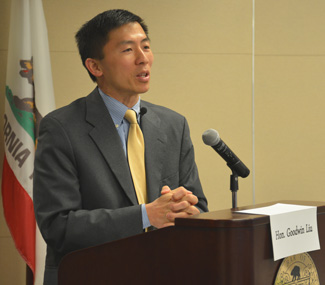Incubator workshop shines spotlight on need for
affordable legal aid
By Amy Yarbrough
Staff Writer
The lack of affordable legal representation in the state is
so staggering, as California Supreme Court Justice Goodwin Liu put it, that
there is just one legal aid lawyer for every 8,000 indigent people.
 |
| Justice Goodwin Liu |
“That means if you were to fill AT&T Park up with indigent
people who qualify for legal aid, there would be just five people in the park
who are legal aid lawyers to serve the entire ballpark,” Liu told a room full
of lawyers and legal service providers last month.
Factor in those who are living at twice the poverty line but
still can’t afford legal representation, and you add another 10 million people
to the problem.
“Even for people at the median income, most people cannot
afford a lawyer,” he said.
Delivered at the first regional meeting of the Modest Means
Incubator Projects on April 24, Liu’s words highlighted the challenges court
users face in California, which has one of the highest poverty rates in the
country. The first of three such meetings scheduled this year, the event
brought together representatives of legal aid foundations, MCLE providers, law
schools and bar associations, to learn about incubator programs helping to
bridge the justice gap – and to brainstorm ideas for starting others.
According to the American Bar Association, there are already
roughly two dozen incubator or law school residency programs nationwide which
help new lawyers obtain practical training while assisting clients of modest
means. There are at least three such programs in California, a number that
proponents hope to at least double through a series of Modest Means Incubator
Projects meetings.
“No one is going to get rich doing this kind of work but the
trend line is very clear,” Liu told the audience at last month. “The days of
big law firms hiring and over-hiring young associates from even the top law
schools and billing the training costs of those young associates to their large
clients … is quickly fading away.”
More than 100 people attended the meeting, which brought
together experts on incubators to talk about their experiences and
organizations interested in either starting or expanding programs. Additional
meetings are scheduled for June 10 in Los Angeles and in the Central Valley in September,
according to Kelli Evans, senior director of administration of justice at the State
Bar.
The brainchild of the California Commission on Access to
Justice, the effort is being funded through $205,000 in grants from the Ford
Foundation, the Public Welfare Fund and the California Bar Foundation. While
some of the money is being used to pay for the meetings, the lion’s share will fund seed grants for incubator projects. A request for proposals is slated
to go out in October.
“We are interested in exploring a variety of models to learn what elements have the biggest impact,” she said.
During the day-long San Francisco event, attendees were
broken into groups and given a half-hour to come up with a new idea for an
incubator project. Not only did the exercise spark unique ideas, but it also
helped forge connections between people, Evans
said.
“The participants were incredibly engaged,” she said. “We had people
taking to each other who are going to continue those discussions.”
One of the highlights of the meeting was an address by Fred
Rooney, considered by many to be the father of the legal incubator movement.
Credited with starting the first law firm incubator at the City University of
New York in 2007, Rooney was hired by the Touro College Jacob D. Fuchsberg Law
Center in 2013 to launch an incubator there.
A former social worker, Rooney obtained his law degree and
began working in legal services in Allentown, Pa. in the late 1980s, work that
paid so little that his family needed subsidized day care and food assistance.
His economic situation ultimately forced Rooney to leave and
start a law practice, despite no real understanding of how to do so.
“I went through four years of hell before we started seeing
the light at the end of the tunnel,” Rooney said. “In terms of the practical
knowledge, we didn’t have it.”
Rooney said he had no idea that the incubator movement would
catch on to the extent that it has. It has grown so much, largely due to the
economy, that a program was started in the Dominican Republic last year, he
said. There have also been talks about bringing one to India.
He also urged participants already involved in incubators or
incubator-like projects to get in touch with the ABA, which has been compiling
information about programs and resources.
“I think we are probably all kindred spirits in that we
believe that liberty and justice for all is not what we read (in books),” he
said. “People deserve better.”
For more information about the incubator program, contact
Rodney Low in the Office of Legal Services, 415-538-2219.